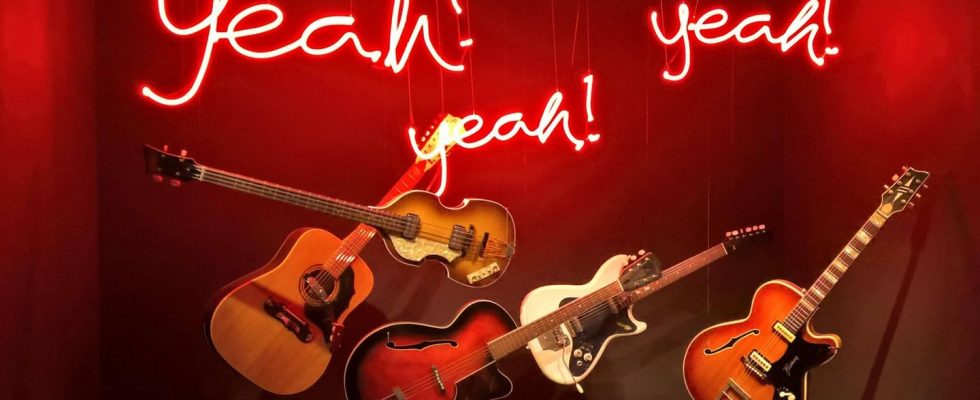column
The Wordsplainer explains Anglicisms
“Yeah” is the English yes: about a battle cry that has many fans and enemies
The Beatles’ “Yeah, Yeah, Yeah” in “She Loves You” has become an iconic line in music
© Manfred Segerer / Imago Images
Luckily, Paul McCartney didn’t listen to his father, who wanted the lyric “She loves you, yes, yes, yes” – because he didn’t like “yeah”! About a little word that is world famous – and not just in music.
By Peter Littger
The German language is rich in meaningful sounds – filler words like “uh”, “eh”, “well”, “doch”, “just”, “presto” or “zack”. They are so short and inconspicuous that they are called “particles” in technical language. Semantic grains of dust that lie like small weights on the sentences and develop their effect: sometimes strengthening, sometimes weakening – and always in need of a little explanation.
Anglicism: The word “yeah” is a source of identity in the USA
As well as yeah, a super grain of the English language that, like “au ja” or “ach so”, belongs to the group of so-called interjections. While him in Although North America is said to have an identity-forming effect, it also found its way into the German particle treasure trove over the course of the 20th century – as if it were still missing!
Would anyone ask what yeah means this someone probably doesn’t come from this world. Yeah has finally become a global word that – similar to the dollar – circulates everywhere, in North Korea, in Russia and even in the United Kingdom of Great Britain and Northern Ireland. The aversion to the Americanization of the English language is traditionally pronounced there – no less than Paul McCartney can report how much: his father told him and John Lennon in the early days of their band The Beatles suggested instead “She loves you, yeah, yeah, yeah!” better “…yes, yes, yes!” to sing. “There’s enough of these Americanisms around”said James McCartney to justify his remarkable proposal. The son did not follow the advice.
Meanwhile, a not dissimilar statement made by Walter Ulbricht as Chairman of the State Council of the GDR two years later, in December 1965, became world famous: “Is it really the case that we now have to copy every piece of dirt that comes from the West? I think Comrades, we should put an end to the monotony of Jeh-jeh-jeh and what it’s all called.” Songs with English lyrics, not least this one Beatleswere then banned in eastern Germany – in vain, as we don’t know until today.
Although Yeah in the Oxford English Dictionary unequivocally as US English where it was apparently first written down in 1863, its origins lie in the British Isles. There the English language had developed from a rather complicated, so-called Four-form system of saying yes and no. Yes served to positively contradict a negative question or assumption, No to confirm them. Yea However, confirm a positive statement and Nay contradicted her:
Don’t you want to take part?
– Yes, I will (take part).
– No, I will (not take part).
Do you want to take part?
– Yes, I will (take part).
– Well, I won’t take part.
While William Shakespeare still tried to adhere to the system in his late 16th and early 17th century writing, he was also one of the first writers to break with it. Not only that remained Yes and No as Two-form system as we know it, but rather it developed into one Yea (initially without h) with different meanings: from a strong yes – similar to the traditional one Aye! (It is still said in the British Parliament today “The Ayes have it – the proposal is accepted”) – to a hesitant, skeptical approval, which is inherent in concerns and often incredulity. This is how things developed Yeah to the English “Yes”.
That in Oxford English Dictionary today also the entries “Yeah, right” and “Yeah, sure” are noted takes into account skepticism, which often expresses contempt and sarcasm. This documents a basic attitude of the Coolness, which is never entirely committed to positivism. It has harnessed its enormous potential and has become the rallying cry of a counterculture “What-you-see-it-what-you-get” of capitalism. Yeah has long served as an affirmation of the residual doubt that actually grew up in the USA over the course of the 20th century: “There’s more than money, baby! There’s love. Yeah!”
Babies also shout “yeah”
Against this background, anyone who would rather start from an attitude to life than logic and in… Yeah If you suspect less of a rational sound and more of an intuitive sound, you can look for the origin in the babies instead of in the Americans – and you will find it. They also shout “Jeh jeh” – ideology-free and almost everywhere in the world. Without question it is one Yeah to life – with the restrictions that a newborn human being has to endure. While it was a so-called holophrase for babies – a word that says everything – it is still the same for adults. That’s probably what makes the cry of life Yeah so powerful.
From this cry, we can Yeah understand it as a holistic sigh of existence. Beyond all hermeneutic skepticism, he pays homage to the high feelings that can only be experienced when there are also valleys – the boredom of contemporary society! She has become a bizarre one Yeahmoment and its own Yeah meme in younger German-speaking culture when Angela Merkel was Chancellor and appeared in Hamburg in 2009. With her “Oh yes” and “Oh no” she was known to be a priestess of particles, which brings us full circle Yeah could become a rallying cry against political boredom. On an election poster with the text “Angela Merkel is coming” it was written in felt-tip pen: “And everyone like this: yeaahh!” There is no longer any doubt that we have now overcome boredom. Or is it? Yeah!

